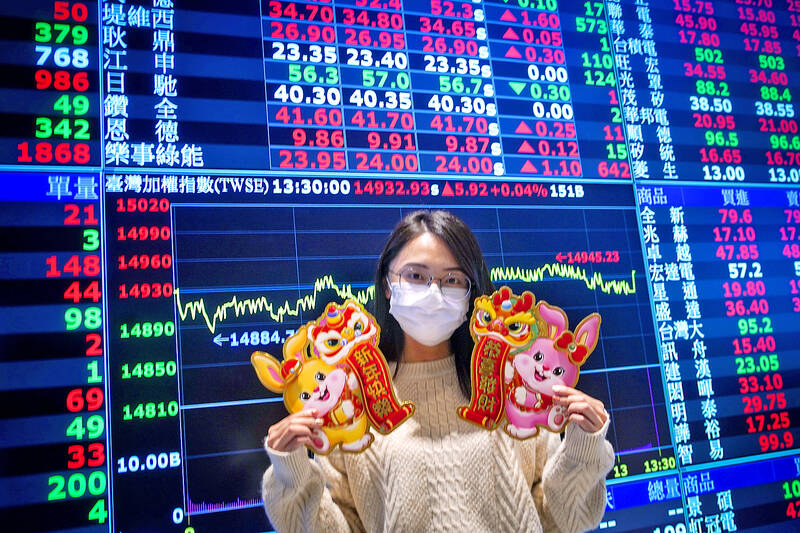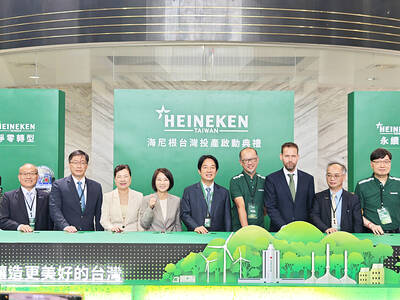The TAIEX edged up 0.04 percent to close at 14,932.93 on the last trading day ahead of the Lunar New Year holiday, but posted a 15.51 percent decline during the Year of the Tiger.
The index lost 2,741.47 points over the lunar calendar year, slashing the main board’s market value by NT$8.1 trillion (US$267.19 billion), Taiwan Stock Exchange data showed.
Trading on the main board was volatile during the Year of the Tiger.

Photo: CNA
HEADWINDS
The TAIEX peaked at 18,338.05 on Feb. 10 last year, but lost steam amid headwinds such as Russia’s invasion of Ukraine, soaring inflation, major central banks’ interest rate hikes and companies’ inventory adjustments, before bottoming out at 12,629.48 on Oct. 25, the data showed.
The market capitalization of listed companies totaled NT$46.87 trillion yesterday, down 14.7 percent from the last trading day of the Year of the Ox.
Taiwan Semiconductor Manufacturing Co (TSMC, 台積電) remained the nation’s largest company by market capitalization, although it lost NT$3.44 trillion to end the Year of the Tiger at NT$13.04 trillion.
Companies in the cable and wire, tourism, biotech and pharmaceuticals, automobiles and chemicals sectors recorded higher increases in share prices compared with other industries, the data showed.
WORST PERFORMER
The transportation sector posted the worst decline of 29.36 percent, followed by the semiconductor sector’s 23.23 percent drop, the data showed.
Foreign institutional investors sold a net NT$1.07 trillion of local shares in the Year of the Tiger, the third consecutive lunar calendar year of net selling, the data showed.
The local bourse is likely to rebound in the Year of the Rabbit, PGIM Securities Investment Trust Enterprise Co (PGIM, 保德信投信) said in a note yesterday, adding that foreign institutional investors are expected to resume buying of Taiwanese equities.
Foreign investors have bought a net NT$125.57 billion of local shares so far this year, the highest among all Asian stock markets, PGIM said.
Technology and electronic components stocks could rebound in the second quarter of this year due to stabilizing inflation, China’s reopening and recovering consumer demand, PGIM said.

purpose: Tesla’s CEO sought to meet senior Chinese officials to discuss the rollout of its ‘full self-driving’ software in China and approval to transfer data they had collected Tesla Inc CEO Elon Musk arrived in Beijing yesterday on an unannounced visit, where he is expected to meet senior officials to discuss the rollout of "full self-driving" (FSD) software and permission to transfer data overseas, according to a person with knowledge of the matter. Chinese state media reported that he met Premier Li Qiang (李強) in Beijing, during which Li told Musk that Tesla's development in China could be regarded as a successful example of US-China economic and trade cooperation. Musk confirmed his meeting with the premier yesterday with a post on social media platform X. "Honored to meet with Premier Li

Dutch brewing company Heineken NV on Friday announced an investment of NT$13.5 billion (US$414.62 million) over the next five years in Taiwan. The first multinational brewing company to operate in Taiwan, Heineken made the statement at a ceremony held at its brewery in Pingtung County. It also outlined its efforts to make the brewery “net zero” by 2030. Heineken has been in the Taiwanese market for 20 years, Heineken Taiwan managing director Jeff Wu (吳建甫) said. With strong support from local consumers, the Dutch brewery decided to transition from sales to manufacturing in the country, Wu said. Heineken assumed majority ownership and management rights

coverage expansion: The industrial PC maker has proposed to acquire 3.938 million Aures shares to strengthen its global smart retail presence Leading industrial PC maker Advantech Co (研華) plans to acquire Aures Technologies SA, a French company known for its point-of-sale (POS) and kiosk equipment, to expand its global coverage in smart retail products and services. Advantech proposed to acquire 3.938 million Aures shares from the French firm’s major shareholder and through a public tender offer at up to 6.7 euros per share, the PC maker said in a statement after announcing the deal at the Taiwan Stock Exchange late on Friday. The company aims to acquire up to 100 percent equity of Aures, a well-known brand in the western market with a

Microsoft Corp yesterday said that it would create Thailand’s first data center region to boost cloud and artificial intelligence (AI) infrastructure, promising AI training to more than 100,000 people to develop tech. Bangkok is a key economic player in Southeast Asia, but it has lagged behind Indonesia and Singapore when it comes to the tech industry. Thailand has an “incredible opportunity to build a digital-first, AI-powered future,” Microsoft chairman and chief executive officer Satya Nadella said at an event in Bangkok. Data center regions are physical locations that store computing infrastructure, allowing secure and reliable access to cloud platforms. The global embrace of AI